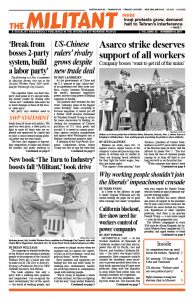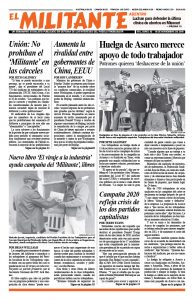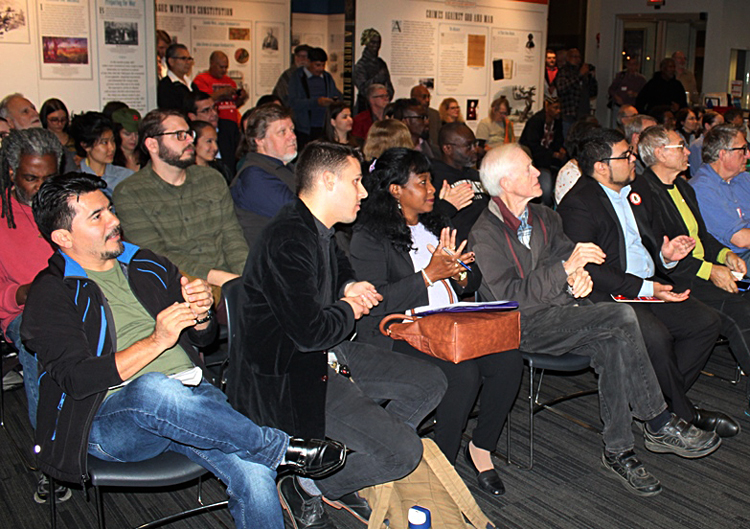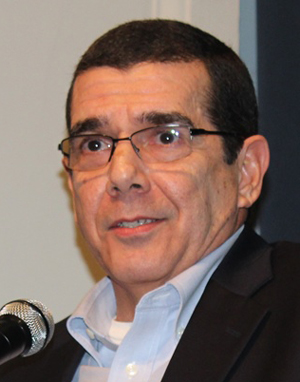WASHINGTON, D.C. — More than 100 participants gathered at the African American Civil War Museum for a “U.S. Imperialist Hands Off Cuba and Venezuela” forum here Oct. 19.
The museum is an important institution in D.C. Its mission “is to correct a great wrong in history that largely ignored the enormous contributions of the 209,145 members of the United States Colored Troops. It tells the stories and preserves for posterity the historic roles these brave men of African, European, and Hispanic descent played in ending slavery and keeping America united under one flag.”
The forum was part of the annual meeting of the National Network on Cuba. It was hosted by the D.C. Metro Coalition in Solidarity with the Cuban Revolution and the NNOC.
Nubia Kai, a leader of the D.C. Metro Coalition and a participant in this year’s May Day International Volunteer Work Brigade in Solidarity with Cuba, opened the event with a powerful poem dedicated to the Cuban Revolution and the country’s fight for sovereignty in the face of attacks by the U.S. government.
Pointing to the murals depicting African American soldiers fighting the slavocracy, José Ramón Cabañas, Cuba’s ambassador to the U.S., said, “This is part of our common culture. We came from the same place, in the same ships — and if you changed the uniforms, we were fighting the same wars for our freedom and independence.”
“We are family,” he continued. “We fought revolutionary struggles to overthrow slavery in Cuba and here in the U.S. Our solidarity has strong historic roots.”
Turning to the U.S. war against the island, Cabañas said, “The purpose of the blockade is to kill our revolution. That has been U.S. policy from the beginning. Our sin, in the eyes of the U.S. government, is we made a revolution and our example and steadfastness in the face of 60 years of hostility by the U.S. government.”
The theme of solidarity was also part of the talk by James Harris, who recently returned from the 6th African Continental Conference in Solidarity with Cuba. Harris is active in the D.C. Metro Coalition and a leader of the Socialist Workers Party. He noted that many at the conference of 300 held in Abuja, Nigeria, asked if activists in the U.S. could organize support for Cuba.
“I explained that the U.S. is a class-divided society. Ordinary working people are interested in learning about the Cuban Revolution,” said Harris. “Our responsibility is to explain that class reality at these conferences. It gives those we meet confidence in their capacities as well as ours.” He thanked the Cuban Institute for Friendship with the Peoples (ICAP) for organizing regional conferences that bring activists with different views together in support of the Cuban Revolution.
“The U.S. economic blockade of Cuba has cost $138 billion since it was instituted,” Dr. Jourdy James Heredia told the gathering. James is deputy director and lead researcher of the Center for the Study and Research of the World Economy in Havana. She pointed to the reinforcement of the blockade by the Trump administration. “Title III of the Helms Burton Act,” which was implemented for the first time this year, “impedes needed foreign investment in Cuba. It allows former capitalists and landowners whose property was nationalized by the revolutionary government to file suits in the U.S. courts to reclaim their property.”
She explained that similar property claims had been settled with every other capitalist country in the world in the 1960s, but the U.S. government has always refused to negotiate them.
“The purpose of this and other measures is to impose suffering on the Cuban people,” she concluded.
Longtime activist and musician Patricio Zamorano brought solidarity to the meeting from the metro-area Foro de Sao Paulo group. Zamorano and the Foro were energetic builders of the meeting from the beginning.
Netfa Freeman, a leader of Pan-African Community Action, spoke about the current sanctions and attacks on Venezuela. Freeman pointed out it was the Barack Obama administration that first imposed sanctions against the Venezuelan regime. He urged solidarity with individuals who in the spring tried to prevent the Venezuelan Embassy here from being seized by the U.S. government. They face up to one year in jail.
Howard County Friends of Latin America leader Leslie Salgado read excerpts from a report by the Council on Hemispheric Affairs outlining the economic and political crisis in Ecuador.
The NNOC meeting continued the following day with reports from solidarity groups around the country on their activities. Major upcoming activities include support for a resolution that will be presented Nov. 7 by the Cuban delegation to the United Nations calling for an end to the U.S. embargo. Participants were also urged to endorse and help build a National Conference for the Normalization of U.S.-Cuba Relations to take place in New York City March 21-22, 2020.
Dan Fein from Chicago, and Arlene Rubinstein from Washington, D.C., contributed to this article.



